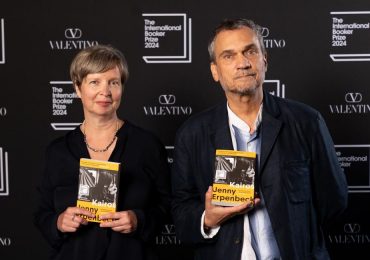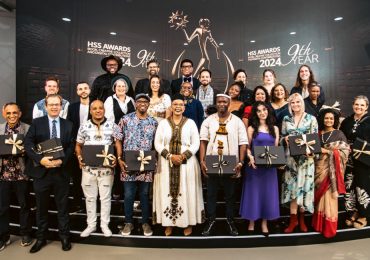The regional winners of the 2020 Commonwealth Short Story Prize, known as the world’s ‘most global literature prize’, have been announced.
Judges praised the winning stories for their ‘lateral leaps, their use of language, voice and subversion—and their sheer courage’.
The winner of the Africa region is Innocent Chizaram Ilo, for his short story ‘When a Woman Renounces Motherhood’.
Ilo is an Igbo writer from Nigeria. Their works interrogate gender, class, memory and sexuality, and they have been published in various anthologies and literary magazines across four continents. They were a finalist for the Gerald Kraak Award, the Short Story Day Africa Prize and the Wilbur Smith Author of Tomorrow Prize. They have also won the Africa YMCA and Oxford Festival of the Arts short story contests.
On hearing of the win, Ilo said:
‘I still can’t wrap my head around it. You know you always dream of this moment, how you’ll scream from the rooftops and rent your clothes. Then it comes by sudden and the only thing you can do is call your mother and cry over the phone about how proud your father would have been if he was alive. This means so much to me. I feel grateful, honoured, proud and humbled, at the same time. This is one of those moments that make me look back at all the late nights and piles of rejection emails and say, “Maybe, just maybe, this writing thing is worth it.”’
The Chair of judges, Ghanaian writer and editor Nii Ayikwei Parkes, said:
‘Innocent’s story is particularly striking for their confidence switching between languages. The unapologetic use of interspersed, un-italicised Igbo and pidgin add a wonderful texture to the storytelling.’
South African writer and musician Mohale Mashigo, the judge representing the African region, commented:
‘”When a Woman Renounces Motherhood” is one of those stories that tell you something shocking and yet leave you with empathy for the characters in a story. The writing is so specific and intimate which makes you want to go back and read it again … and again.’
The Commonwealth Short Story Prize is awarded annually for the best piece of unpublished short fiction from the Commonwealth’s fifty-four member states. It is the only prize in the world where entries can be submitted in Bengali, Chinese, English, French, Greek, Malay, Portuguese, Samoan, Swahili, Tamil and Turkish. Short stories translated into English from other languages are also eligible.
2020 Commonwealth Short Story Prize regional winners
- Africa: ‘When a Woman Renounces Motherhood’ by Innocent Chizaram Ilo (Nigeria)
- Asia: ‘The Great Indian Tee and Snakes’ by Kritika Pandey (India)
- Canada and Europe: Wherever Mister Jensen Went’ by Reyah Martin (United Kingdom)
- Caribbean: ‘Mafootoo’ by Brian S Heap (Jamaica)
- Pacific: ‘The Art of Waving’ by Andrea E Macleod (Australia)
Regional winners receive £2500 (about 54,000) and the overall winner receives £5000 (about R109,000).
The overall winner will be announced in an online ceremony on Tuesday 30 June 2020.
The international judging panel, chaired by Ghanaian writer and editor Nii Ayikwei Parkes, chose the five winning stories from a shortlist of twenty, after over five thousand entries were submitted from forty-nine countries.
Parkes says:
‘I don’t believe there is a perfect story; there are great stories, but no perfect stories. What is amazing is what happens when a story encounters a ready reader or listener—that moment is magic.
‘That connection is never the same for any two people or for any two moments and that’s why I love judging competitions: I get to talk about stories with other people who love stories, but it’s completely unpredictable.
‘We now have a list of regional winning stories that are striking for their lateral leaps, their use of language, voice and subversion—and their sheer courage. I look forward to the discussions with my fellow judges to pick an overall winner. I guarantee that it will be a story that moves people, but I don’t know which one it will be.’
More about the winning stories
Africa
‘When A Woman Renounces Motherhood’, by Nigerian writer Innocent Chizaram Ilo, tells of how a woman and her mother bond in the face of a sexist tradition. Twenty-three-year-old Ilo, who is Igbo, lives in Lagos, and explains that the story was ‘inspired by my mother. No, she hasn’t renounced motherhood, at least not yet. But I just wanted to capture what women like my mother lose and give up in the name of marriage and, by extension, motherhood.’
Asia
Indian author Kritika Pandey’s winning entry, ‘The Great Indian Tee and Snakes’, is the story of two young people trying to solve the age-old riddle of human existence: how does one love in the era of hatred and prejudice?
Twenty-nine-year-old Pandey, who was born in Ranchi, Jharkhand, India, is a Pushcart-nominated writer, currently living in the United States. She chose to submit to the prize because, she says, it is ‘one of those few literary awards that value the unique context of the postcolonial writer’.
Canada and Europe
Scottish author Reyah Martin’s story ‘Wherever Mister Jensen Went’ explores the power of rumour and hysteria, for better or for worse. This story challenges society, calling for change before it’s too late. Twenty-year old Martin, who was shortlisted for the 2018 BBC Young Writers’ Award, commented, ‘I am now more determined than ever to carry on creating. It feels like a dream.’
Caribbean
Jamaican author Brian S Heap wins the Caribbean regional prize. In ‘Mafootoo’, a Jamaican woman living in England confronts a crisis late in her life. She uses the occasion to reflect on her life and her marriage. Seventy-year-old Heap, who has worked in drama and education in Jamaica for forty years, drew on his own experience growing up in the United Kingdom and returning as a visitor.
Pacific
Australian Andrea E Macleod wins this year’s Pacific regional prize for her story ‘The Art of Waving’. The story describes how, as a child, a woman is told by her older sister not to wave to people. She reflects on how this changed her and the connections she has been both able and unable to make as a result. Forty-eight-year-old Macleod, who lives and works in Brisbane, says her story began ‘as a question about why we wave to each other and what stops us from waving to everyone. How do we become inhibited? What is expressed when we wave? How do we learn to cross boundaries and connect with people we don’t know or probably have no likelihood of knowing in our own spheres of experience?’
~~~
Joining Parkes on the 2020 judging panel are South African writer and musician Mohale Mashigo, executive director of the Singapore Books Council William Phuan, Canadian author Heather O’Neill, Trinidadian scholar and writer Elizabeth Walcott-Hackshaw and Australian writer and arts organiser Nic Low, who was himself shortlisted for the 2012 Commonwealth Short Story Prize.
The five regional winners’ stories will be published online by the literary magazine Granta in the run-up to the announcement of the overall winner.
Luke Neima, Granta’s Digital Director and Online Editor, says:
‘For many years Granta has proudly partnered with Commonwealth Writers to publish the five regional winners of the Commonwealth Short Story Prize—one each from Africa, Asia, the Caribbean, the Pacific, and Canada and Europe.
‘The prize gives a platform to places isolated from the traditional infrastructure of publishing, and through it we’ve had the chance to discover a range of brilliant new voices, many of whom go on to find success on bookshelves around the world.
‘In every regional winners’ list there are new voices and new worlds to discover, and this year’s is no exception. We hope that you will enjoy these stories as much as we have.’
Now in its ninth year, the Commonwealth Short Story Prize has developed a strong reputation for discovering new writers and bringing them to a global audience. Previous regional winners such as Indian author Anushka Jasraj and Bahamian writer Alexia Tolas have gone on to achieve considerable success. Jasraj’s debut short story collection Principles of Prediction is due to be published in 2020. She won the Asia regional prize twice for her stories ‘Radio Story’ (2012) and ‘Drawing Lessons’ (2017), both of which feature in the collection. 2019’s Caribbean regional winner Tolas has been longlisted for the 2020 Sunday Times Audible Short Story Award. Lynda Clark, 2018 regional winner for Europe and Canada, published her debut novel Beyond Kidding in October 2019, and Granta’s top ten fiction reads of 2019 featured last year’s overall winner, ‘Death Customs’ by Constantia Soteriou.
Last year’s Africa winner was Zambian author Mbozi Haimbe for her story ‘Madam’s Sister’. Haimbe won a PEN/Robert J Dau award for her winning story, which will be part of their 2020 anthology launching this autumn.
Since the prize’s inception in 2012, the Africa Region has had just one previous overall winner: Jennifer Nansubuga Makumbi, who won in 2014 for her story ‘Let’s Tell This Story Properly’.






It’s a disgrace that Media 24 Books made “a mistake” when it appointed only Arum Lily judges. Where do these people live? South of France, Vrystaat…? Are they blind, deaf, or plain racist?